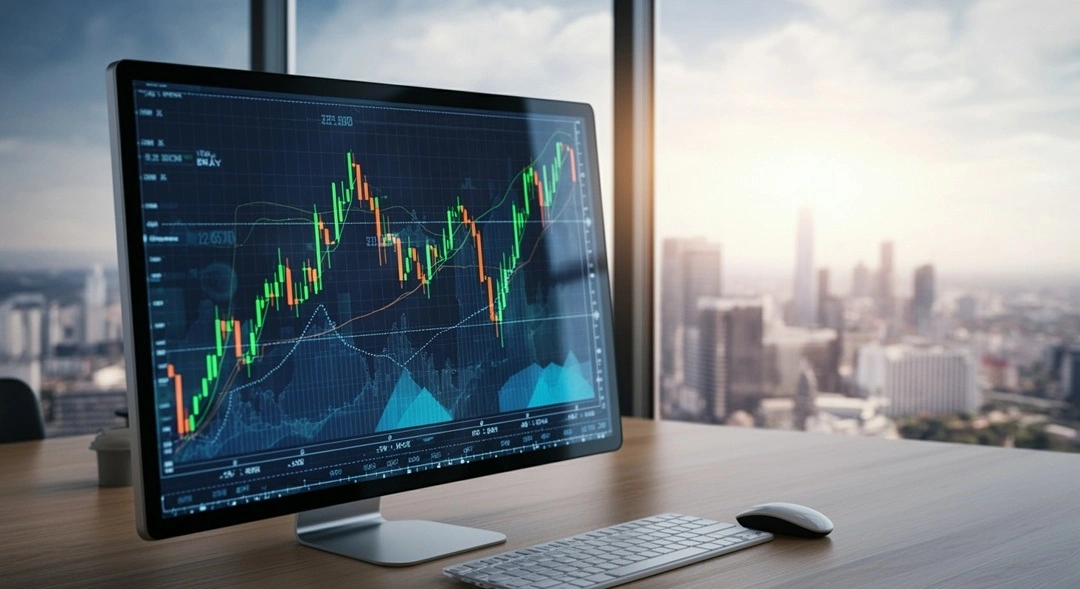The world of forex trading can seem intimidating if you're just starting out. With so many unfamiliar terms and concepts to grasp, it's easy to feel overwhelmed.
But don't worry - we've got you covered. Understanding a few core forex trading basics will set you up for success as you begin your journey in this dynamic market.
Let's dive into the five most important forex trading concepts to familiarize yourself with before taking the plunge.
Master these, and you'll have a solid foundation on which to build your knowledge and skills.
What is Forex Investing?
You've probably heard that forex stands for "foreign exchange." But what exactly does that mean? In simple terms, forex is the global market for trading one country's currency for another.
Known as the largest and most liquid market in the world, over $6 trillion is traded on the forex market daily.
At its core, forex investing involves speculating on the changing value of different currencies. Traders buy one currency (the base currency) and simultaneously sell another (the quote currency), betting that the value of the base currency will increase compared to the quote currency within a given time frame.
While most day-to-day currency exchanges involve businesses moving money between international operations or tourists converting cash while traveling, forex traders take positions without physically buying or selling the actual currencies - they simply profit from price fluctuations.
Major currency pairs that see the highest trading volumes involve the US dollar (USD) paired against other strong currencies like the euro (EUR), Japanese yen (JPY), British pound (GBP), Canadian dollar (CAD), Australian dollar (AUD), Swiss franc (CHF) and more.
Transactions usually involve trading in margin accounts, with leverage sometimes providing 100:1 payouts based on currency movements.

What are the Basic Concepts I Need to Understand Before Investing in Forex?
Now that you have a basic understanding of what forex is, let's move on to some key concepts all successful traders learn early:
- Pips and Lot Sizes - Currency pairs are quoted out to four decimal places, with each place known as a "pip." Pips indicate the smallest possible price change in any given currency pair. Standard lot sizes represent 100,000 units of the base currency, with pip movements directly affecting profits and losses.
- Bid/Ask Spreads - When trading currencies, you'll see two prices quoted - the bid (what buyers are willing to pay) and higher ask (what sellers want). The difference is the bid/ask spread, which acts as a small fee you pay to trade.
- Economic Factors - Much like other financial markets, currencies constantly fluctuate based on supply and demand forces. Interest rates, inflation, GDP numbers and global political events all sway exchange rates on a daily basis. Savvy traders study these macros.
- Leverage - Forex brokers allow massive leverage on small deposit amounts, multiplying your buying power. While this magnifies returns on winning trades, it also intensifies losses when factors move against your position. Risk management is crucial.
- Chart Patterns - Technical analysis of historical price charts reveals oft-repeating patterns that can provide trading cues. Candlestick formations, moving averages, support/resistance zones - understanding such patterns helps identify potential entry and exit points.
Armed with knowledge of these fundamental forex concepts, you'll be well equipped to carefully test strategies and find low-risk opportunities to get experience in live markets.
Let's now look at some core forex strategies.
What are the Most Common Forex Trading Strategies?
With the fundamentals out of the way, it's time to discuss core forex trading strategies beginners need in their arsenal.
Developing proficiency with even a few approaches provides a massive competitive edge over the hordes of new traders who enter without a proven game plan.
Here are three strategies that should be your priority to learn:
- Trend Following: This involves buying into upward price momentum or selling into downward moves. Monitoring and plotting longer-term moving averages like the 50 and 200-day SMAs helps identify primary trends. Medium to long-term trades held for weeks or months capitalize on trends for solid returns if risks are well managed.
- Range Trading: When prices are stuck traversing sideways between support and resistance levels, range strategies allow profiting from short-term fluctuations. Tactics include scalping, breakouts, and trading bounces off daily highs and lows. Proper risk controls prevent losses if ranges are broken.
- Fundamental Analysis: Staying on top of economic reports, central bank actions, political news and more arms traders with an informational edge. Predicting likely reactions to scheduled or unexpected releases supports trades aligned with likely events. Examples are shorting dollars ahead of dovish Fed tone or buying loonies on robust jobs beats.
All beginners should test multiple timeframes with simulated accounts until developing a feel for these essential tactics.
Successful forex traders don't leave the markets to chance - they deploy proven strategies to gain an edge. Mastering these few will serve you very well.

What Role Does Risk Management Play in Forex Investing?
The forex market is famously volatile, with currencies whipsawing on geopolitical tensions, economic announcements, central bank actions and more.
Such gyrations present both risk and opportunity - handled right, volatility expands your trading toolkit.
To make the most of it:
- Trade with a volatility-adjusted position size based on recent price swings. Too big a bet risks wipeout.
- Leverage volatility with spread trading strategies seeking to profit no matter which way a pair breaks out of a range.
- Take some profits early and often on winning positions. You're usually better locking in a bird in hand than chasing larger gains.
- Maintain a measured perspective through drawdowns using dollar-cost averaging to buy dips rather than panic-selling.
- Respect interim support/resistance levels on charts, which tend to be retested amid turbulent periods.
- Consider hedging long and short exposures across correlated pairs to reduce net market exposure when uncertainty reigns.
- Most of all, trust your predefined risk rules. Sticking to a proven plan mitigates rash decisions driven by fear or greed.
- With experience, savvy forex traders learn to profit from wild swings instead of fearing them. Taking a pragmatic, slightly conservative approach serves you best over the long haul.
How Do I Choose a Forex Broker?
All forex traders need a forex broker to access the interbank market and execute their trades. But not all brokers are created equal - it pays to select a partner as committed to your success as you are.
When shopping around, focus on:
- Regulation - Only work with brokers licensed and regulated by reputable financial authorities. Look for membership in programs like the UK's FSCS for additional protections.
- Trading conditions - Check spreads, commissions, leverage caps and other costs. Find the best overall value without compromising on quality or compliance standards.
- Technology - Use robust platforms suitable for your preferred trading style, like multi-award winning Jetonbank's web and app solutions. Seek diverse functionality and optimal order execution.
- Education - Ongoing learning is key. Cherish brokers enriching clients through webinars, courses and other learning materials hosted on their dedicated training portals.
- Customer service - Phone, email and live chat options should provide timely, expert support 24/5 for assistance, complaint escalation or withdrawals.
- Payment methods - Look for convenience via debit/credit cards, local transfers, e-wallets and wire services in addition to crypto.
Weigh all considerations carefully before committing funds. A trustworthy, well-capitalized partner like Jetonbank ensures your focus stays fully on trading, not bureaucratic headaches.
Make the right choice upfront for a smoother forex journey ahead.
The possibilities of the high-octane forex world await once novice traders do their research. Remember - success stems from formulating a methodical approach based on fundamentals, yet adapting it fluidly as ever-shifting market dynamics demand.
With diligent study and prudent risk controls in your corner, getting started was never so straightforward. Why not open a practice Jetonbank account today and start mapping your strategy?

